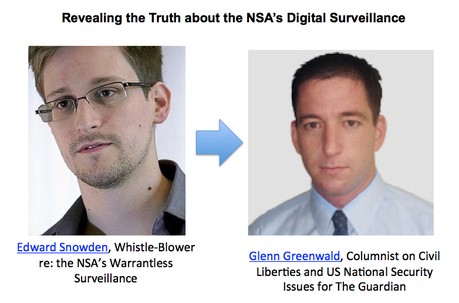Have We Consented to Government Surveillance?
Do Citizens, Residents, and People in Other Countries Have a Right to Privacy in the Digital Age?
The American Civil Liberties Union (ACLU) is suing the National Security Administration for violating the Bill of Rights. European privacy activists are demanding that U.S. companies based in Europe not release their data to the U.S. government. Digital surveillance has reached a tipping point. Can we reverse it?
NETTING IT OUT
Edward Snowden’s whistle-blowing is revealing the US National Security Agency’s (NSA’s) practices:
- Collect all digital communications as they occur without a warrant (warrantless wire-tapping).
- Store and analyze these digital communications to detect patterns and anomalies.
- Retain much of that information in case it is needed in a future situation in which an individual or group are suspected of being a possible threat to our national security.
- Permit access to the content of peoples’ communications without a warrant by tens of thousands of “analysts,” many of whom who work for government contractors.
- Require American corporations to provide data dumps to the NSA of all customers’ postings and communications, no matter what the customers’ nationalities.
This is not a US-only practice. It has to stop now or we will never be free from oppression.
Revealing the Truth about the NSA’s Digital Surveillance
DO CITIZENS HAVE A RIGHT TO PRIVACY FROM THEIR GOVERNMENT?
Legally and Theoretically Yes; Practically, in the Digital Age, No!
The 1984 “Big Brother” era is clearly here. Our every move can be easily monitored, our conversations easily captured. Only our silent thoughts are our own. That’s chilling.
With the advent of big data—unlimited and inexpensive data storage, powerful analytic engines, and lots of smart people learning how to detect new patterns—all the information we provide by our interactions and our activities, both online and offline, is being scooped up and scrutinized by our government (at least in the USA) in order to detect possible misdeeds or “bad” beliefs before we do something that might harm others.
Many states in the U.S. now routinely use license plate tracking as well as toll-booth information to monitor where our cars go. In many parts of the world, including in many counties in the U.S., drones are now also being used to stalk us.
Thanks to whistle-blower Edward Snowden, we’ve recently learned that our phone conversations are grabbed and analyzed, and that all of our online activities, including our emails and searches, are siphoned off the Internet as they occur—all without “consent of the governed.”
Will Citizens Impose Legal Limits on their Government’s Digital Spying?
 Edward Snowden’s revelations and his personal sacrifice appear to be paying off—at least somewhat. In late July and early August 2013, members of both parties in the U.S. Congress began to slough off their indifference and demand answers and reforms from our intelligence agencies and from our executive branch—which appears to have clearly overstepped its bounds. On July 28, 2013 Jonathan Weisman wrote in the Sunday New York Times:
Edward Snowden’s revelations and his personal sacrifice appear to be paying off—at least somewhat. In late July and early August 2013, members of both parties in the U.S. Congress began to slough off their indifference and demand answers and reforms from our intelligence agencies and from our executive branch—which appears to have clearly overstepped its bounds. On July 28, 2013 Jonathan Weisman wrote in the Sunday New York Times:
“What began on the political fringes only a week ago has built a momentum that even critics say may be unstoppable, drawing support from Republican and Democratic leaders, attracting moderates in both parties and pulling in some of the most respected voices on national security in the House.
The rapidly shifting politics were reflected clearly in the House on Wednesday, when a plan to defund the National Security Agency’s telephone data collection program fell just seven votes short of passage. Now, after initially signaling that they were comfortable with the scope of the N.S.A.’s collection of Americans’ phone and Internet activities, but not their content, revealed last month by Edward J. Snowden, lawmakers are showing an increasing willingness to use legislation to curb those actions.
Representatives Jim Sensenbrenner, Republican of Wisconsin, and Zoe Lofgren, Democrat of California, have begun work on legislation in the House Judiciary Committee to significantly rein in N.S.A. telephone surveillance. Mr. Sensenbrenner said on Friday that he would have a bill ready when Congress returned from its August recess that would restrict phone surveillance to only those named as targets of a federal terrorism investigation, make significant changes to the secret court that oversees such programs and give businesses like Microsoft and Google permission to reveal their dealings before that court.
‘There is a growing sense that things have really gone a-kilter here,’ Ms. Lofgren said.”
~ Jonathan Weisman, “Momentum Builds Against NSA Surveillance”
Isn’t Spying What Intelligence Services Do?
Those in favor of giving our intelligence agencies free rein argue that their charter requires them to take all means to keep us safe from threats—both all legal means and clandestine means (which may be sanctioned implicitly or explicitly by someone in power, in secret). Others feel that it’s okay for each country to spy on citizens in other countries; just not on citizens in their own country, without a warrant.
The problem with this approach is that if all people are being spied on by someone’s government, and if all data is stored, analyzed, and can be shared with intelligence agencies in other “friendly” countries based on “legitimate” circumstances, that means that all the data from our phone calls, emails, internet searches, and commercial transactions, is, for all practical purposes, accessible to any government agency in any country…
(Download the PDF to read the entire article.)
Sign in to download the full article
0 comments
Be the first one to comment.




